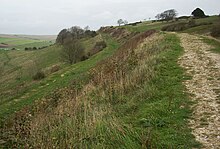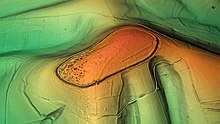| Site of Special Scientific Interest | |
 Rampart of Cissbury Ring | |
| Location | West Sussex |
|---|---|
| Grid reference | TQ 145 078[1] |
| Interest | Biological |
| Area | 84.2 hectares (208 acres)[1] |
| Notification | 1986[1] |
| Location map | Magic Map |
Cissbury Ring is an 84.2-hectare (208-acre) biological Site of Special Scientific Interest north of Worthing in West Sussex.[1][2] It is owned by the National Trust[3] and is designated a Scheduled monument for its Neolithic flint mine and Iron Age hillfort.[4]
Cissbury Ring is the largest hill fort in Sussex, the second largest in England[5] and one of the largest in Europe overall, covering some 60 acres (24 hectares).[6] The earthworks that form the fortifications were built around the beginning of the Middle Iron-Age possibly around 250 BC[7] but abandoned in the period 50 BC - 50 AD.


The site of the fort contains a Neolithic mine, one of the first flint mines in Britain. Around 270 shafts were dug into Cissbury hill over around 300 years of use. Shafts were up to 12 metres (39 ft) deep with 7 metres (23 ft) diameters at the surface. Up to eight galleries extended outwards from the bottoms of the shafts, often interconnecting with one another. The site has been damaged by illicit metal detecting.[8]
- ^ a b c d "Designated Sites View: Cissbury Ring". Sites of Special Scientific Interest. Natural England. Retrieved 21 April 2019.
- ^ "Map of Cissbury Ring". Sites of Special Scientific Interest. Natural England. Retrieved 21 April 2019.
- ^ "Cissbury Ring". National Trust. Retrieved 21 April 2019.
- ^ Historic England. "Cissbury Ring hillfort, prehistoric flint mine and associated remains (1015817)". National Heritage List for England. Retrieved 21 April 2019.
- ^ "Cissbury Ring".
- ^ MacCurdy, George Grant (1 January 1905). "Review of Neolithic Dew-Ponds and Cattle-Ways". American Anthropologist. 7 (3): 529–531. doi:10.1525/aa.1905.7.3.02a00080. JSTOR 659048.
- ^ "Worthing's Historical Features - Visit Worthing".
- ^ "Cissbury Fort 'damaged by metal detectors'". BBC News. 25 November 2016.